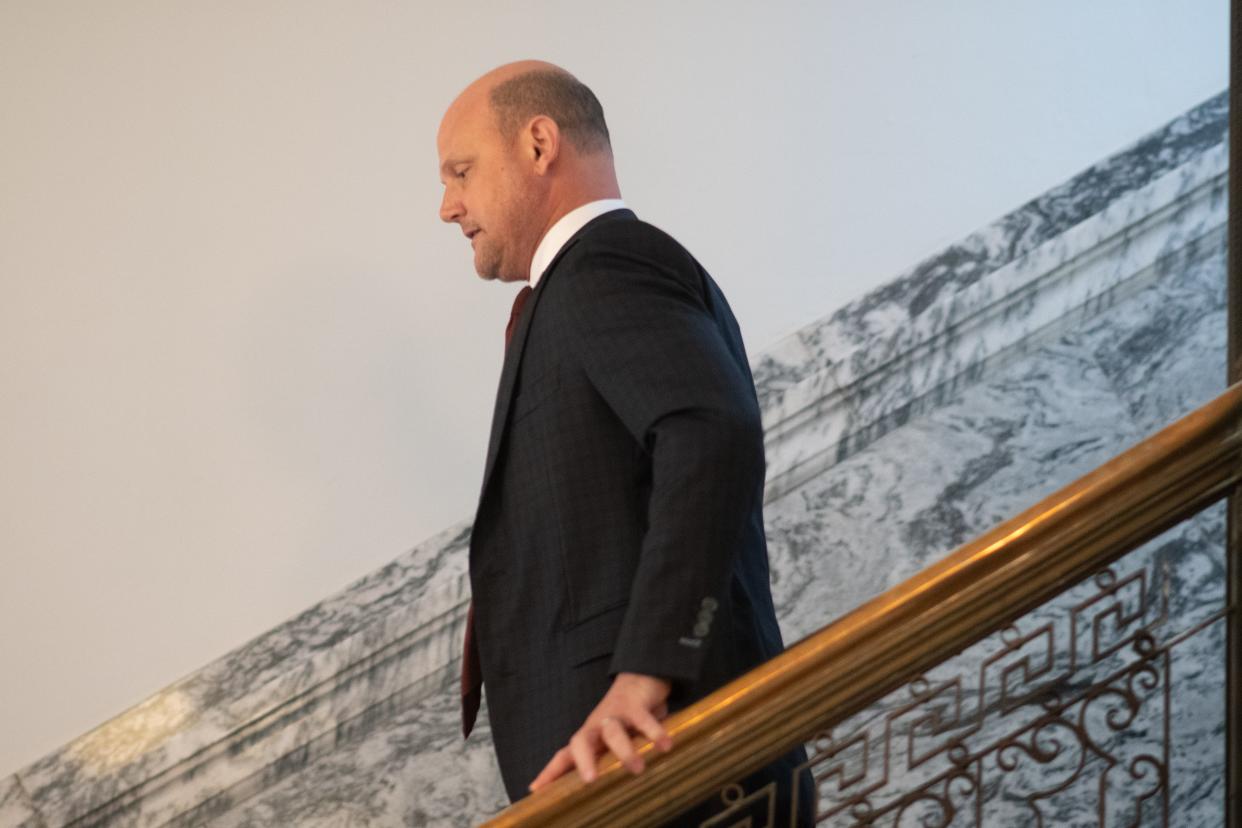Secretary of State Scott Schwab broke open records law in provisional ballot data request: Court

- Oops!Something went wrong.Please try again later.
Secretary of State Scott Schwab violated open record law by concealing provisional ballot data from a civic engagement group, the Kansas Court of Appeals ruled Friday.
The case was brought by Davis Hammet, of Loud Light, with the assistance of the ACLU.
"This is a clear victory for government transparency, public records access," said ACLU attorney Josh Pierson, who argued the case.
It stems from a request for a provisional ballot report, which the secretary of state's office was able to generate before eliminating that functionality.
"When the Secretary directed ES&S to turn off the computer feature that generates the provisional ballot detail report — a report correctly declared to be a public record — he denied reasonable public access to that public record," Judge Stephen Hill said in the ruling. "That denial of public inspection of a public record violates the Kansas Open Records Act."
Hill wrote the unanimous opinion overturning Shawnee County District Court Judge Teresa Watson's decision. The case now goes back to Watson with directions to order Schwab to restore the reporting feature.
"We received it this morning and are reviewing," Whitney Tempel, Schwab's spokesperson, said in an email.
Schwab, a Republican, is running for reelection and has a primary challenger on the Aug. 2 ballot.
More: Audits, voting machines and TikToks: Mistrust sparks GOP race to be Kansas' top election official
The appellate court made no directive about fees and penalties. However, it did note that the district court may award attorney fees if Schwab's actions were not in good faith and civil penalties may be assessed against the agency if it intentionally refused to furnish the records.
Helping voters fix provisional ballot deficiencies
The Election Voter Information System, known as ELVIS, is the statewide voter registration database. Schwab had directed the state's computer software vendor to turn off an ELVIS computer feature that generated a provisional ballot detail report. The report contains data on provisional ballots inputted by county election officials.
Counties are not mandated by law to track provisional ballot data, but many choose to do so.
Hammet's goal was to identify people who had cast provisional ballots so that his civic group could help them fix whatever problem was preventing their votes from being counted.
"Four years ago, I started investigating the thousands of ballots being thrown out each election," Hammet said. "Open records requests for the provisional ballot data allowed me to expose illegal policies that were disenfranchising voters, and allowed Loud Light to launch programs to ensure Kansans votes are counted."
He has long sought such records, with one request in 2019 for the 2018 election data. After the secretary of state's office denied that request, he sued in 2020. Schwab ultimately provided the 2018 report after a court order to do so.
Hammet then requested the same report for 2020 primary elections. Two days after Schwab produced those reports, he told the software vendor to remove the ability to create the reports.
More: Court orders elections officer to disclose records
Judges: Lower court ruling would have nullified KORA
The company implemented the change in September, essentially eliminating the ability for the government to quickly and cheaply comply with another request Hammet filed in October.
Hammet ultimately lost a second lawsuit because Watson ruled that the report was no longer a public record after Schwab had the company remove the ability to produce it.
The appeals court disagreed. They said the data collected by the secretary of state's office is a public record. None of the 55 exceptions to the state's open records law applied in the case.
"That ruling would allow all computer records of public information to become inaccessible through the simple manipulation of what the computer system is asked to do," Judge Hill said of the lower court's legal reasoning.
The effect would be nullifying KORA in the age of computer records, the higher court opined.
"Today’s ruling shines a light into the darkness of Kansas's secretive government," Hammet said.
More: Judge rules Kansas secretary of state didn't violate open records law in dispute over ballot report
Court: Schwab twice broke open records law
While arguing that his motivations are irrelevant, "The Secretary has never really offered a reason why" he had the functionality removed after losing the first court case, Hill wrote. There is no evidence to suggest it improved ELVIS or decreased government costs.
"Simply put, the Secretary did not want it," Hill said.
Schwab violated open records law, the appeals court said, when he had the computer feature turned off and again when he demanded an excessive fee to hire a data specialist to write a script to pull the data.
"This report feature may have been of no use to the Secretary but it was useful to Hammet and the public," Hill said. "And that is the point of open public records. Public access is the rule, not the exception."
More: Topeka has 16 candidates running for Kansas Legislature. Here's your guide to Aug. 2 election.
Jason Tidd is a statehouse reporter for the Topeka Capital-Journal. He can be reached by email at jtidd@gannett.com. Follow him on Twitter @Jason_Tidd.
This article originally appeared on Topeka Capital-Journal: SOS Scott Schwab broke KORA law in Kansas election ballot data request

